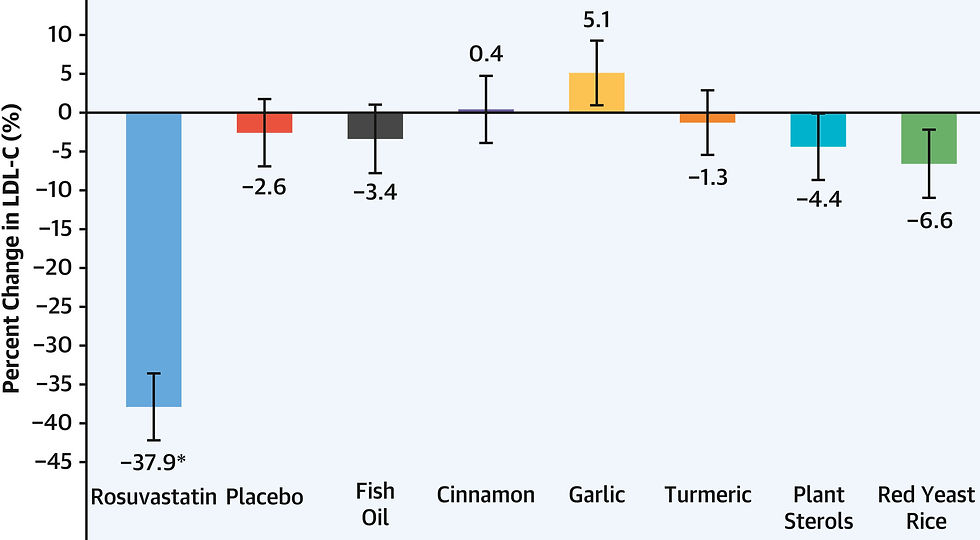The Power of Rosuvastatin: A Comprehensive Review of Efficacy and Safety
- Christian Kaiser

- Apr 9, 2024
- 3 min read
Updated: May 3, 2024
Dive into the efficacy and safety profile of rosuvastatin, a potent statin medication, through an in-depth analysis of recent studies. Discover how CleverCareMD can support your cardiovascular health journey.

In the realm of cardiovascular health, the importance of lipid management cannot be overstated. Rosuvastatin, a statin medication renowned for its efficacy in lowering cholesterol levels, has emerged as a cornerstone in the prevention of cardiovascular events. As a leading provider of innovative healthcare solutions, CleverCareMD is committed to empowering individuals with knowledge about the benefits and risks associated with rosuvastatin.
Efficacy of Rosuvastatin: Recent Insights
Recent studies have shed light on the remarkable efficacy of rosuvastatin in reducing low-density lipoprotein cholesterol (LDL-C) levels, a key driver of atherosclerosis. A study published in "Comparative efficacy and safety of rosuvastatin versus other statins for primary prevention: A meta-analysis of randomized controlled trials" demonstrated that rosuvastatin significantly outperformed other statins in LDL-C reduction, highlighting its potency in lipid management.
Furthermore, rosuvastatin has shown promising results in improving lipid profiles in various patient populations, including those with familial hypercholesterolemia and metabolic syndrome. A study published in "Effects of rosuvastatin on lipid profile, inflammatory factors, and arterial stiffness in patients with metabolic syndrome: A randomized controlled trial" reported significant reductions in LDL-C and triglyceride levels with rosuvastatin therapy, underscoring its versatility in addressing diverse lipid abnormalities.
Safety Profile of Rosuvastatin: A Critical Evaluation
While the efficacy of rosuvastatin is well-established, it is crucial to examine its safety profile to ensure optimal patient care. Recent research has provided valuable insights into the safety of rosuvastatin, with studies consistently reporting a favorable risk-benefit profile.
A comprehensive meta-analysis published in "Real-world effectiveness and safety of rosuvastatin: A systematic review and meta-analysis" evaluated the safety data of rosuvastatin across multiple clinical trials and real-world studies. The analysis concluded that rosuvastatin was associated with a low incidence of adverse events, with muscle-related side effects and liver abnormalities being rare occurrences.
Clinical Considerations and Future Directions
In clinical practice, the selection of statin therapy should be guided by individual patient characteristics, including age, comorbidities, and medication tolerability. While rosuvastatin offers potent lipid-lowering effects, clinicians must weigh the benefits against the potential risks to optimize patient outcomes.
Looking ahead, ongoing research aims to further elucidate the long-term safety and efficacy of rosuvastatin, particularly in special populations such as the elderly and those with comorbidities. By staying abreast of emerging evidence, healthcare providers can refine treatment strategies and enhance patient care in the evolving landscape of cardiovascular medicine.
Conclusion
In conclusion, rosuvastatin stands as a formidable ally in the fight against cardiovascular disease, offering potent lipid-lowering effects and a favorable safety profile. Through a thorough examination of recent studies, CleverCareMD remains committed to empowering individuals with knowledge about the efficacy and safety of rosuvastatin, ensuring informed decision-making and optimal cardiovascular health outcomes.
Bibliography
What did you think about our comprehensive review of rosuvastatin? If you have any questions or would like to learn more about cardiovascular health, please don’t hesitate to get in touch with us via our website or on our social media channels.
Warm regards,
Christian Kaiser - Doctoral Researcher





Comments